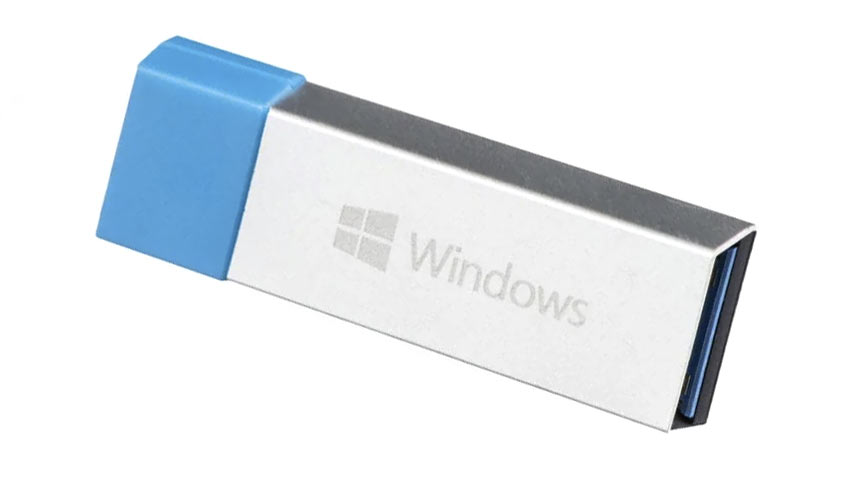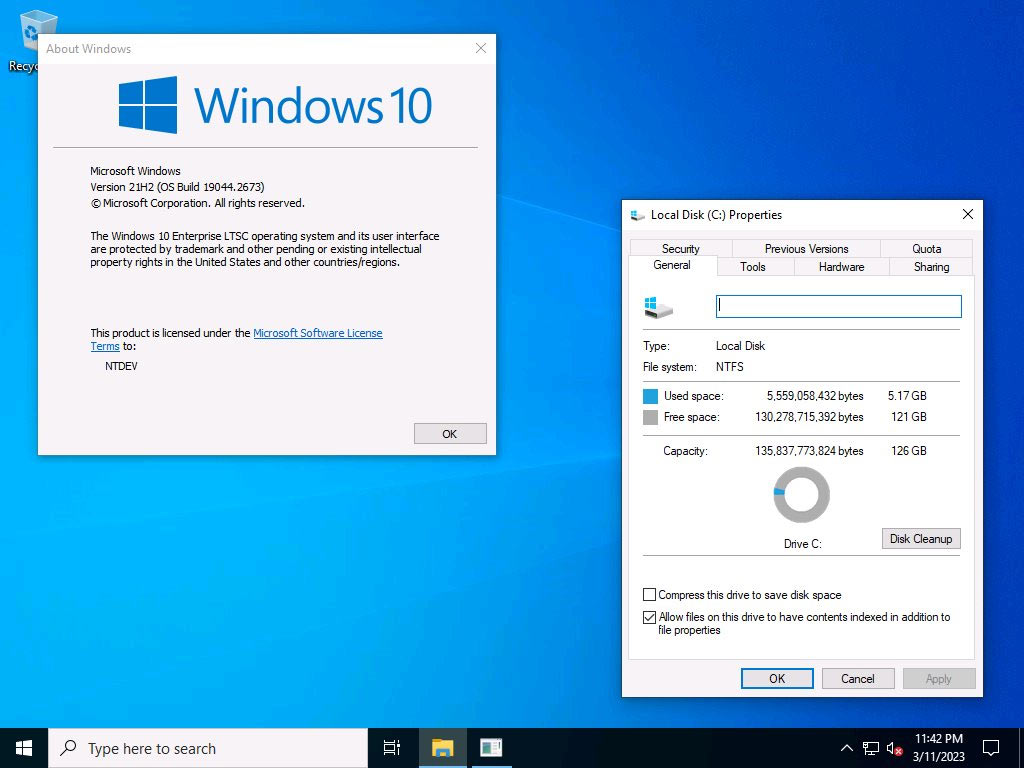Tiny10 Version 2303 Is Updatable, Occupies Just 5.2GB
Final Tiny10 release is aimed at those with “a truly old computer.”

Tiny10 version 2303 has just been released. The newest version of this lightweight Windows 10 installation image aims to fold in some of the recently added advantages of Tiny11. NTDEV, the Developer of both Tiny 11 and Tiny10, says the latter is ideal for those with “a truly old computer,” as long as it uses an x86 processor. The recommended lower RAM / storage limits of Tiny11 are about 2GB / 16GB, so Tiny10 should slot in slightly below this to save the day for Windows devotees looking to revive an older system.
In a social media thread, and on the official Tiny10 page at Archive.Org, NTDEV says that version 2303 of this project is based on Windows 10 LTSC 2021. This is going to be the last release of Tiny10, says the developer. The reasoning behind this decision is that the software has been “superseded by Tiny11.”
Some of the niceties that were brought over from Tiny11 to Tiny10 include the ability to “update the OS and add new features with ease” via the component store. Security should also be enhanced by a fully functional Windows Defender app / service. Also, a much-requested feature that has arrived in the latest release of Tiny10 is Remote Desktop and Terminal Services.
In our coverage of Tiny11, we noted that the compact OS was comfortable with systems equipped with as little as 2GB of RAM, and only used about 12GB of disk space. Just for fun, some people squeezed it further. We don't see a hard reference about RAM requirements for Tiny10, but it should run just fine with 2GB given that's Microsoft's official minimum requirement for 64-bit Windows 10.
If you go back far enough in computer time, systems with 1GB or less were common until roughly 2006 or 2007. The arrival of Windows Vista in 2007, with its reputation for sluggishness and thirst for better hardware, helped make systems with 1GB RAM history, even though the reign of XP arguably continued until SP3’s EOL in 2014. But 1GB of RAM is officially supported on 32-bit versions of Windows 10, so there's a good chance that Tiny10 will run at least reasonably well if your system is severely limited in the memory department. Within reason, of course.
If you grab Tiny10, it won’t be activated, but should work with old Windows 7 or 8 keys – which you may have on an old PC or laptop struggling with a regular Windows 10 (or 11) installation. See our tutorial on how to find your windows product key if your system has one. If not, see how you can get Windows 11 for free or cheap.
When installed, this Tiny10 release uses just slightly more than 5GB of disk space. So drive space shouldn't be an issue for almost anyone.
We recently published a guide to installing Tiny11 on a PC, and tested the Tiny11 for Arm release on a Raspberry Pi. NTDEV says they won’t be making a version of Tiny10 for Arm. We're sure that's probably disappointing to at least three people out there.
Get Tom's Hardware's best news and in-depth reviews, straight to your inbox.

Mark Tyson is a news editor at Tom's Hardware. He enjoys covering the full breadth of PC tech; from business and semiconductor design to products approaching the edge of reason.
-
Giroro I disagree that Tiny10 is superseded by Tiny11. Windows 11 isn't even close to a fully functional replacement to Windows 10.Reply
Maybe give Microsoft another 2 years or so to undo all of their " One lazy engineer designed this while pretending to work from home" terribleness. Windows 11 is barely up to an alpha level of polish - and that's if you're willing to change several dozen register entries. It's way worse than it looks, which is impressive considering how bad it looks. -
bigdragon Ever try an old OS on a new computer? It absolutely sprints nonstop. The speed, the responsiveness, and the amount of resources available to run your application(s) of choice rules. There is way too much crap going on in the background with the newer operating systems. I don't want some of my resources collecting telemetry for someone else to monetize, updating widgets and assistants I don't use, or determining the most annoying time to pop up a feedback hub notification asking me to submit a review nobody will ever look at.Reply
Tiny10 and Tiny11 look impressive. I'm glad someone is debloating Windows. They're worth consideration next time I get or build a new PC. -
TechieTwo If someone is using an older computer Tiny 10 is probably the last O/S they'd want to install.Reply -
JeffreyP55 Reply
Still isn't ready for primetime so Joe Sixpack can just hit the go button.PlaneInTheSky said:Just use Linux Mint instead of going through all this mess.
Messed with DOS and Unix way back when. I'm done with that.. -
SiliconFly ReplyGiroro said:I disagree that Tiny10 is superseded by Tiny11. Windows 11 isn't even close to a fully functional replacement to Windows 10.
Maybe give Microsoft another 2 years or so to undo all of their " One lazy engineer designed this while pretending to work from home" terribleness. Windows 11 is barely up to an alpha level of polish - and that's if you're willing to change several dozen register entries. It's way worse than it looks, which is impressive considering how bad it looks.
I too like Win10 better than Win11. But for gaming, I use Win11. For all other purposes, I stick to Win10. Have it in dual boot. -
PlaneInTheSky ReplyJeffreyP55 said:Still isn't ready for primetime so Joe Sixpack can just hit the go button.
Messed with DOS and Unix way back when. I'm done with that..
If you think Linux Mint is difficult, not sure what to tell you. 🤷 Propably one of the easiest distros to use.
It's a lot easier to use than Windows, that's for sure, you don't have to go through 6 different menus to find a settings.
The last Windows that was user-friendly was windows 7. Finding a setting in Windows 8/10/11 is a nightmare of overlapping new and old menus with completely different UI.
Windows has been a mess since Windows 8. Bloated OS, confusing setting menus, touch intertwined with mouse/keyboard menus, TPM requirements the average person doesn't understand, Bloatware. Telemetry, a horrible update system.
You need a Microsoft degree just to understand all the privacy settings when you install Windows.
It's no wonder that people with money have moved to Apple and people with sense moved to Linux. -
JeffreyP55 Reply
Tried Mint a couple of years ago. Audio surround sound drivers and assorted others didn't load so being the impatient old fart I am. Lost Distro# who knows how many..PlaneInTheSky said:If you think Linux Mint is difficult, not sure what to tell you. 🤷 Proably one of the easiest distros to use.
It's a lot easier to use than Windows, that's for sure, you don't have to go through 6 different menus to find a settings.
The last Windows that was user-friendly was windows 7. Finding a setting in Windows 8/10/11 is a nightmare of overlapping new and old menus with completely different UI. -
PlaneInTheSky ReplyJeffreyP55 said:Tried Mint a couple of years ago. Audio surround sound drivers and assorted others didn't load so being the impatient old fart I am. Lost Distro# who knows how many..
Sure, I get that. But you can't really blame Mint for that, some hardware companies are great at supporting Linux, some suck. Nothing Mint can really do about it, it improves the more users adopt Linux.
But I totally get it if there is specific hardware you need support for, I'm not one of those people who blame users. If it doesn't work, it doesn't work, the average person should not be jumping through hoops to get something to work.
